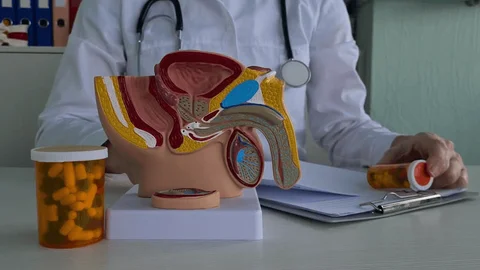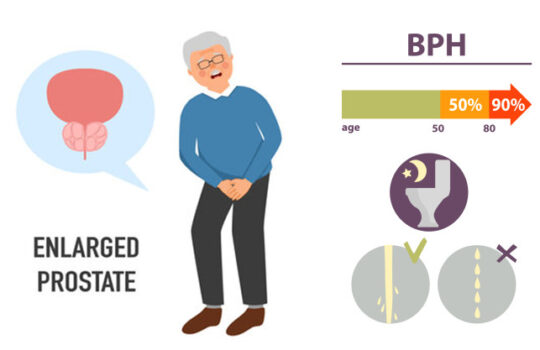Prostate Enlargement: Symptoms, Causes & Treatment In Men

Prostate Enlargement
Imagine having the urgent need to urinate only for comfort not to come and restlessness all over. For many men, this isn’t a here-and-there thing — it is an everyday struggle against an enlarged prostate that affects millions across the world.
When they are 60, over 50% of males have to deal with prostate enlargement known as benign prostatic hyperplasia (BPH) in medical circles. The growth of this gland located just under the bladder can slowly increase in size, restricting the urethra and making life unbearable due to its symptoms. Its effects are numerous such as making regular bathroom visits interfere with sleep or always feeling like you haven’t emptied your bladder completely thereby creating uneasiness. Hence, understanding about the causes of its occurrence, signs it presents, and possible therapies are essential for regaining comfort as well as quality of life.
Let us now look at what enlarged prostate entails and how you can deal with this common but difficult condition confidently by making informed choices
Table of Contents
- What is Prostate Enlargement or Benign prostatic hyperplasia (BPH)? (Prostate Enlargement
Meaning) - What are the Prostate Enlargement Symptoms and Problems?
- Prostate Gland Normal Size vs. Enlarged
- Prostate Enlargement Reasons (Causes)
- Prostate Enlargement Complications
- Prostate Enlargement Diagnosing
- Prostate Enlargement Medicine & Treatment Options
- Conventional Medicine
- Treatment of Prostate Enlargement in Ayurveda
- Prostate Enlargement Foods to Avoid & Dietary Precautions.
- Prostate Enlargement Precautions & Lifestyle Tips.
- Conclusion
What is Prostate Enlargement or Benign prostatic hyperplasia (BPH)? (Prostate Enlargement Meaning)
The term that is used to describe the enlargement of prostate gland in men, especially those above 40 years old is Benign Prostatic Hyperplasia (BPH). This small gland which produces semen lies just below the bladder in front of rectum and helps in male reproduction. Many people have realised that as a man grows older, there are chances that the size of his prostate might go up beyond the usual sizes thereby causing different types of urinary problems and other physical discomforts. If not treated, this can make a man’s life miserable though with no inclusion of malignant cells.

What are the Prostate Enlargement Symptoms and Problems?
- Urinary Frequency
Good hygiene is important. To prevent bacteria from spreading, always wipe from front to back after using the toilet. Also, teach children how to be hygienic to reduce the risk of getting infection.
- Urinary Urgency
There are instances when people suddenly feel like they want to pee and this may make it difficult for them to reach a lavatory on time. - Weak Urine Stream
Apart from this, starting or stopping while trying to take urine out of the body may prove problematic; thus, being described as unique symptoms that come with an enlarged prostate gland.
- Incomplete Emptying
It is also possible for men with BPH not to feel their bladder emptying completely after peeing which causes them to visit restrooms again and again.
- Physical Discomfort
Pain or discomfort during urination or ejaculation can also occur, along with lower abdominal pain due to bladder overactivity.
- Impact on Sexual Health
Prostate enlargement may result in sexual dysfunction thereby leading to impotence or reduced sexual desire.
Prostate Gland Normal Size vs. Enlarged
Size / shape Matters: As men age, the prostate grows from a walnut to a Ping-Pong ball, but
in some, it expands to the size of a tennis ball!
An enlarged prostate mainly median lobe can lead to blocked urine flow and severe problems
in the bladder, urinary tract, or kidneys. Conditions like BPH and prostate cancer can increase
prostate size. BPH is most common among older men.

Prostate Enlargement Reasons (Causes)
By knowing what causes prostate enlargement, you could be able to prevent or treat it.
BPH is caused by several factors:
- Age and Hormone Alterations Age is one of the factors that predisposes to benign prostatic hyperplasia (BPH). Prostate growth is induced by hormone irregularities especially those linked with changes in testosterone and dihydrotestosterone (DHT) levels.
- Lifestyle Factors Lifestyle including diet, exercise among others has an influence on prostate health. Consumption of a lot of saturated fats and inadequate fruits and vegetables are some causes of BPH. Physical inactivity besides being overweight also increases the risk of being diagnosed with enlarged prostate.
- Genetic Predisposition A family history makes you more likely to develop BPH. If someone has close relatives who have had an enlarged prostate gland, they are more at risk for developing it themselves.
Prostate Enlargement Complications
In men over 40 with benign prostatic hyperplasia (BPH), Inguinal Hernia is common. Prostate enlargement leads to strain during urination, further weakens the weaker part of abdominal muscles.
This weakness allows a part of the abdominal content to protrude, causing a bulge in the groin. If neglected, this condition can lead to severe complications, exerting increased pressure on surrounding tissues and vessels, necessitating immediate surgery. Hernia can be unexpected consequence of an enlarged prostate in men above age of 40.
Prostate Enlargement Diagnosing
If you experience symptoms of prostate enlargement, it is crucial to seek medical advice for an accurate diagnosis. The diagnostic process typically includes:
- Medical History and Physical Examination Your doctor will review your medical history and perform a physical examination, including a digital rectal exam (DRE) to assess the size and condition of the prostate gland.
- Diagnostic Tests: Prostate-Specific Antigen (PSA) Test A blood test that measures PSA levels. Elevated PSA levels can indicate prostate enlargement, infection, or prostate cancer.
- Urinalysis A test to check for signs of infection or other urinary issues.
- Ultrasound Imaging tests like transrectal ultrasound (TRUS) can provide detailed images of the prostate gland to help assess its size and identify abnormalities.
- Additional Tests In some cases, urodynamic tests, cystoscopy, or MRI may be required to evaluate the severity of BPH and rule out other conditions.
Prostate Enlargement Medicine & Treatment Options
Treatment for BPH depends on the severity of symptoms and the impact on daily life. Options include:
- Conventional Medicine- Several medications are available to treat BPH, including:
- Alpha Blockers These medications relax the muscles of the bladder neck and prostate, making it easier to urinate.
- 5-Alpha Reductase Inhibitors These drugs reduce the size of the prostate gland by blocking the hormonal changes that cause prostate growth.
- Combination Therapy In some cases, a combination of alpha blockers and 5-alpha reductase inhibitors may be prescribed for better symptom relief.
- Surgical Options: For severe symptoms or complications, surgical procedures may be necessary:
- Transurethral Resection of the Prostate (TURP): The most common surgical procedure for BPH, where excess prostate tissue is removed to improve urine flow.
- Laser Therapy: High-energy lasers are used to remove or shrink excess prostate tissue.
- Prostatectomy: In rare cases, the complete removal of the prostate gland may be required.
Treatment of Prostate Enlargement in Ayurveda.
Try taking Proscure, an Ayurveda medicine formulated for maintaining a healthy prostate. It offers a holistic way of handling BPH symptoms by employing naturally occurring herbs commonly found in Ayurvedic tradition recognized for their curative properties which has made it an exceptional formula for managing prostatitis.
- Petha Seed : Petha Seed contributes to prostate health by its anti-inflammatory and antioxidant properties. It aids in reducing inflammation, preventing oxidative stress and promoting a healthy prostate.
- Gokhru : Gokhru is a potent herb with diuretic properties. It not only helps in relieving symptoms of an enlarged prostate but also supports overall urinary health, making it an essential component in addressing prostate related concerns.
- Khajoor Leaf : Known for its anti-inflammatory properties, Khajoor Leaf helps reduce inflammation in the prostate gland, easing discomfort and promoting overall prostate health.
- Varun Chaal : Varun Chaal is renowned for its diuretic and anti-inflammatory properties. It aids in reducing the size of an enlarged prostate. Improving urinary flow and alleviating associated symptoms.
- Apamarg : Apamarg is known for its therapeutic effects. It helps in reducing prostate gland enlargement, improving urine flow and providing relief from symptoms associated with prostate disorders.
- Palash Flower: Palash Flower is valued for its anti-inflammatory and antimicrobial properties. It supports the overall health of the prostate by reducing inflammation and preventing infections that might lead to prostate-related issues.
Prostate Enlargement Foods to Avoid & Dietary Precautions
The alternative treatments and natural remedies are the most used by many men who are trying to cure BPH. Although they cannot replace medical treatment, these practices can be included in the treatment plan:
- Change your diet : Incorporate foods that contain vitamins, antioxidants and minerals into your daily menu. Examples of such foods include tomatoes (lycopene), berries, green leafy vegetables that help in keeping a healthy prostate.
- Water : It is crucial to drink enough water every day on top of avoiding excessive fluid intake especially at night to reduce nocturia.
Prostate Enlargement Precautions & Lifestyle Tips
- Lifestyle Changes and Home Remedies: For mild symptoms, lifestyle modifications can be effective. Reducing caffeine and alcohol intake, maintaining a healthy diet, regular exercise, and bladder training techniques can help manage symptoms.
- Exercises : Pelvic floor exercises or Kegels are great exercises for strengthening the muscles around the bladder that may assist with urinary control problems.
- Avoid excessive caffeine and alcohol
- Avoid intake fluid at bedtime.
- Avoid Prolonged Sitting.
Conclusion
Prostate growth is one of the commonest diseases that can greatly influence a man’s standard of living. To manage BPH appropriately, it is necessary to know the causes, realize its symptoms and opt for an early examination. It is possible to apply diverse medications, and also conduct different surgical operations; however, this condition can still be treated using natural methods . By leading a healthy way of life as well as being concerned about prostate health in advance, men can reduce the influence of BPH on the quality of their lives.
Struggling with prostate enlargement symptoms?
FAQ
What are the first signs of prostate problems?
The first signs of prostate problems are primarily related to urinary function, such as a frequent urge to urinate, especially at night, a weak or thin urine stream, difficulty starting or stopping urination, and a feeling that the bladder is not completely empty.
What size prostate is considered enlarged?
A prostate of 30 gram (or cc) or more is generally considered enlarged, : As men age, the prostate grows from a walnut to a Ping-Pong ball, but in some, it expands to the size of a tennis ball!
What are the worst foods for an enlarged prostate?
Worst foods for an enlarged prostate include alcohol, caffeine, red meats.
What are the complications of an enlarged prostate?
Complications of an enlarged prostate can leads to strain during urination, further
weakens the weaker part of abdominal muscles.
Hernia can be unexpected consequence of an enlarged prostate in men above age of 40.
Can an enlarged prostate be cured with Ayurveda?
An Ayurveda medicine formulated for maintaining a healthy prostate. It offers a holistic way of
handling BPH symptoms by employing naturally.
About Dr. Kalpit Acharya
- Kalpit Acharya is a dedicated and passionate Ayush Surgeon, with expertise in various surgical procedures including Abdominal surgeries & Ano rectal surgeries, wound management and Ayurvedic para-surgical procedures. Combining his clinical expertise with a strong academic foundation in M.S. General Surgery (Shalya Tantra).
- He has achieved notable recognition, including winning prizes in prestigious competitions like SANGAM 2024 @ IIT BOMBAY and AAVISHKAR 2024. Additionally, Dr. Acharya was awarded for his research in the field of Ayurveda and modern medicine at IIT Bombay, IIT Delhi, and ACTREC TMC.
- Dr. Acharya is committed to providing Surgical & holistic care that addresses the physical, mental, and spiritual well-being of his patients through the integration of Ayurvedic principles and modern medical knowledge.







